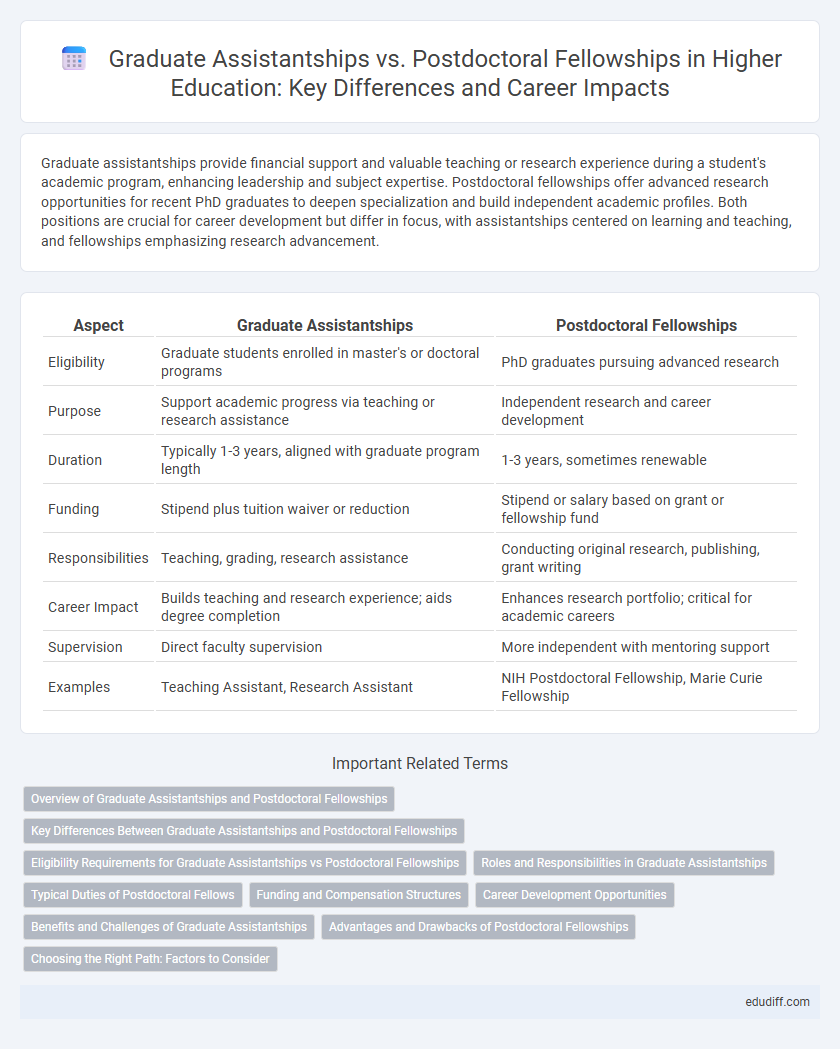Graduate assistantships provide financial support and valuable teaching or research experience during a student's academic program, enhancing leadership and subject expertise. Postdoctoral fellowships offer advanced research opportunities for recent PhD graduates to deepen specialization and build independent academic profiles. Both positions are crucial for career development but differ in focus, with assistantships centered on learning and teaching, and fellowships emphasizing research advancement.
Table of Comparison
| Aspect | Graduate Assistantships | Postdoctoral Fellowships |
|---|---|---|
| Eligibility | Graduate students enrolled in master's or doctoral programs | PhD graduates pursuing advanced research |
| Purpose | Support academic progress via teaching or research assistance | Independent research and career development |
| Duration | Typically 1-3 years, aligned with graduate program length | 1-3 years, sometimes renewable |
| Funding | Stipend plus tuition waiver or reduction | Stipend or salary based on grant or fellowship fund |
| Responsibilities | Teaching, grading, research assistance | Conducting original research, publishing, grant writing |
| Career Impact | Builds teaching and research experience; aids degree completion | Enhances research portfolio; critical for academic careers |
| Supervision | Direct faculty supervision | More independent with mentoring support |
| Examples | Teaching Assistant, Research Assistant | NIH Postdoctoral Fellowship, Marie Curie Fellowship |
Overview of Graduate Assistantships and Postdoctoral Fellowships
Graduate assistantships provide graduate students financial support through research, teaching, or administrative duties, often including tuition waivers and stipends. Postdoctoral fellowships offer early-career researchers specialized training and funding to advance independent research beyond the doctoral degree, typically lasting one to three years. Both assistantships and fellowships enhance academic experience, but assistantships focus on skill development during graduate study, while fellowships emphasize research autonomy in postdoctoral phases.
Key Differences Between Graduate Assistantships and Postdoctoral Fellowships
Graduate assistantships primarily support current graduate students through teaching or research roles, often providing tuition remission and stipends, whereas postdoctoral fellowships target individuals who have completed their doctoral degrees, emphasizing advanced research training with higher stipends and independent project development. Graduate assistantships typically involve structured academic responsibilities within university departments, while postdoctoral fellowships offer greater autonomy and focus on publishing research to advance academic careers. Funding sources also differ, with assistantships often funded by university budgets and fellowships supported by grants or external agencies tailored to scholarly advancement.
Eligibility Requirements for Graduate Assistantships vs Postdoctoral Fellowships
Graduate Assistantships require enrollment in a graduate program, often necessitating a minimum GPA and relevant academic background, with eligibility typically limited to current master's or doctoral students. Postdoctoral Fellowships demand completion of a doctoral degree and focus on advanced research experience, usually within a specific timeframe after earning the PhD, such as within five years. Eligibility criteria for postdoctoral roles emphasize research independence and scholarly productivity, whereas assistantships prioritize academic standing and potential for teaching or research support.
Roles and Responsibilities in Graduate Assistantships
Graduate Assistantships typically involve a combination of teaching, research, and administrative duties that support faculty members and academic departments. Graduate assistants often lead discussion sections, grade assignments, assist with laboratory work, and contribute to academic projects under faculty supervision. These roles provide practical experience and professional development opportunities while allowing students to fund their education.
Typical Duties of Postdoctoral Fellows
Postdoctoral fellows primarily engage in advanced research under the mentorship of principal investigators, contributing to scientific publications and grant proposals that enhance their academic profiles. They often supervise graduate students and assist with laboratory management, developing specialized expertise in their field of study. These duties foster professional growth and prepare postdoctoral fellows for independent academic or industry careers.
Funding and Compensation Structures
Graduate assistantships typically offer a stipend and tuition remission as compensation, providing financial support tied closely to teaching or research duties. Postdoctoral fellowships generally provide higher salary levels with more specialized research funding, often without tuition benefits but with potential for additional grant opportunities. Funding structures differ in duration and scope, with assistantships linked to academic terms and fellowships supporting extended postdoctoral research projects.
Career Development Opportunities
Graduate assistantships provide hands-on experience in research and teaching, fostering practical skills essential for academic and professional advancement. Postdoctoral fellowships offer specialized training and independence in research, enhancing expertise and expanding scholarly networks crucial for securing faculty positions. Both pathways contribute uniquely to career development through mentorship, skill-building, and professional connections within academia.
Benefits and Challenges of Graduate Assistantships
Graduate Assistantships offer financial support and valuable teaching or research experience but often require balancing significant workload alongside academic responsibilities. Stipends may be modest compared to postdoctoral fellowships, and assistantship roles can limit time available for independent research or professional development. Despite these challenges, graduate assistantships provide crucial mentorship and skill-building opportunities that enhance career readiness within academia and related fields.
Advantages and Drawbacks of Postdoctoral Fellowships
Postdoctoral fellowships provide advanced research opportunities and greater academic freedom compared to graduate assistantships, enabling scholars to deepen expertise and build independent research portfolios. However, these fellowships often offer limited job security and lower financial compensation, creating challenges for long-term career stability. The intensive focus on research can also restrict teaching experience, potentially impacting future academic job prospects.
Choosing the Right Path: Factors to Consider
Graduate assistantships often provide tuition waivers and teaching experience ideal for students seeking academic career foundations, while postdoctoral fellowships offer specialized research opportunities with higher compensation designed for advanced scholars. Key factors include career goals, desired level of independence, and financial needs, as assistantships support skill development with more supervision whereas fellowships emphasize independent research productivity. Institutional resources and mentorship quality also critically influence the decision between gaining foundational experience or advancing with focused research expertise.
Graduate Assistantships vs Postdoctoral Fellowships Infographic

 edudiff.com
edudiff.com